
See Deaf West Theatre’s Spring Awakening. See it if you’ve never seen Spring Awakening before. See it if like this reviewer you’ve seen nearly a dozen Spring Awakenings in all. Just do it, because you won’t see direction more brilliant nor a cast more gifted nor a production more awe-inspiring than the Spring Awakening now being staged by Deaf West.
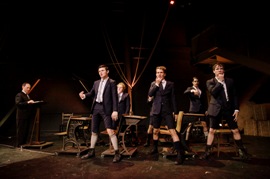 Those of you who might wonder how the first professional resident Sign Language Theater west of the Mississippi could possibly put on a musical, let alone one as challenging as the 2007 Tony winner (for Best Musical, Best Book, Best Score—and five more), can rest assured. Deaf West has considerable experience with musicals under its belt, its Big River having transferred first to the Taper and then to Broadway, followed by Pippin (also at the Taper), both of them done as they’d never been done before.
Those of you who might wonder how the first professional resident Sign Language Theater west of the Mississippi could possibly put on a musical, let alone one as challenging as the 2007 Tony winner (for Best Musical, Best Book, Best Score—and five more), can rest assured. Deaf West has considerable experience with musicals under its belt, its Big River having transferred first to the Taper and then to Broadway, followed by Pippin (also at the Taper), both of them done as they’d never been done before.
Steven Sater and Duncan Sheik’s musical adaptation of Frank Wedenkind’s groundbreaking 1891 drama may well be Deaf West’s most spectacular musical revival so far.
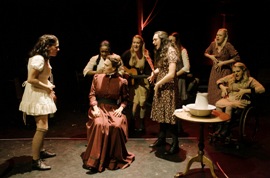 My previous Spring Awakening reviews have detailed the show’s background, plot, and original Broadway staging, and for those who’d like to know more about who its teen-angsty cast of characters are, where they came from, and how they made the leap from a late 19th-century German play to early 21st-Century Broadway, do click here.
My previous Spring Awakening reviews have detailed the show’s background, plot, and original Broadway staging, and for those who’d like to know more about who its teen-angsty cast of characters are, where they came from, and how they made the leap from a late 19th-century German play to early 21st-Century Broadway, do click here.
Those who’ve seen Spring Awakening before may feel free to simply read on.
With straight plays like 2005’s Open Window (staged at the Pasadena Playhouse), Deaf West’s process has been a fairly simple one. Deaf actors sign dialog while hearing actors translate simultaneously—and unobtrusively—into spoken words.
Deaf West musicals take this approach several steps further, dividing roles about half-and-half between hearing performers (who speak and sing while simultaneously signing dialog and lyrics) and deaf or hearing-impaired actors who sign as their hearing doubles provide spoken and sung words.
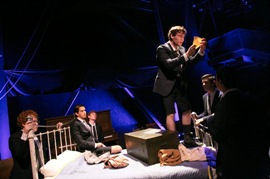 Perhaps more than any previous Deaf West production, Spring Awakening has its deaf performers and their hearing counterparts actually sharing roles, and though the focus remains on the shared role’s deaf actor, the speaking-singing “other halves” have considerably more to do this time than simply serving as the main performers’ shadows, whether it be acting/reacting in tandem with their non-speaking/singing counterparts or serving as their inner voice/conscience or simply being part of each character’s human complexities.
Perhaps more than any previous Deaf West production, Spring Awakening has its deaf performers and their hearing counterparts actually sharing roles, and though the focus remains on the shared role’s deaf actor, the speaking-singing “other halves” have considerably more to do this time than simply serving as the main performers’ shadows, whether it be acting/reacting in tandem with their non-speaking/singing counterparts or serving as their inner voice/conscience or simply being part of each character’s human complexities.
Having all but one of the production’s seven speaking/singing “other-halves” double as members of Spring Awakening’s ten-piece band adds extra spice to the savory mix, a guitar-strumming Katie Boeck shadowing Sandra Mae Frank’s Wendla, Rustin Cole Sailors not only strumming guitar chords but giving Daniel N. Durant his rocker’s voice, and Daniel David Stewart’s onstage piano providing accompaniment as Stewart speaks and sings for Joshua Castille’s Ernst, to cite just three examples.
A review can only begin to highlight the multitude of inspired touches Broadway star Arden (Tom Sawyer in Deaf West’s Big River and the speaking/singing half of Pippin) brings to Spring Awakening as its director.
Breaking at times from Deaf West speaking-signing tradition, Arden opts to title certain sequences, most notably in the schoolboys’ Latin class, and (in one particularly striking instance) by having a scene between two deaf actors play out in complete silence, with only a single written word (projected over and over and with increasing size and force) conveying the sequence’s underlying gist to horrific effect. And when Arden has a deaf cast member speak one of the musical’s most devastating lines in a voice we have heretofore not heard, it becomes even more devastating.
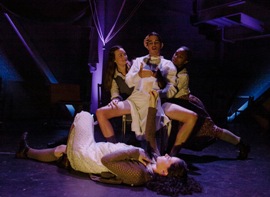 A number of signature Spring Awakening moments benefit from Arden’s prodigious imagination, as when one character’s “self-pleasuring” gets aided and abetted by the schoolgirls who not only feed his fantasy but sign his words, thereby freeing his own hands for (excuse the pun) the task at hand. There’s even a clever nod to the Broadway original’s ubiquitous hand mikes in Melchior’s “Totally Fucked.”
A number of signature Spring Awakening moments benefit from Arden’s prodigious imagination, as when one character’s “self-pleasuring” gets aided and abetted by the schoolgirls who not only feed his fantasy but sign his words, thereby freeing his own hands for (excuse the pun) the task at hand. There’s even a clever nod to the Broadway original’s ubiquitous hand mikes in Melchior’s “Totally Fucked.”
Spencer Liff’s choreography integrates ASL and dance to stunning effect, without once imitating Bill T. Jones’ now signature Tony-winning moves, making this Spring Awakening’s “The Bitch Of Living” and “Totally Fucked” every bit the showstoppers they’ve been in productions past … and but with distinctive twists and turns.
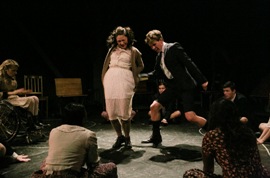 Arden’s casting choices prove as inspired as his direction.
Arden’s casting choices prove as inspired as his direction.
Austin McKenzie gives Melchior a sweetness and innocence that turn the town’s seductive “teen idol” into someone considerably more sympathetic and complex, and the Arizona native, barely out of high school himself, both sings and signs to perfection (having already learned ASL before being cast). Broadway’s Joseph Haro is not only teen-idol handsome and vocally gifted to boot, he gives the seductive, sexually fluid Hanschen real heart. Jimmy Bellinger’s gleefully geeky Georg and Glee vet Ali Stroker as Anna both sing and act quite terrifically, and having Stroker play Anna from her own wheelchair adds diversity to an already diverse mix.
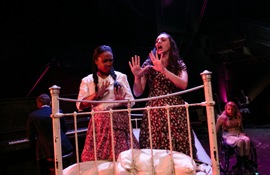 As for Lauren Patten, whose 2007 West Coast debut as the Rubicon’s Anne Frank introduced us to the then fifteen-year-old Chicago native, I have never seen a more extraordinarily powerful Ilse, no mere teen runaway this time round but a deeply troubled sexual abuse victim just barely holding it together, and Patten’s deep, powerful pipes give Adele a run for her money.
As for Lauren Patten, whose 2007 West Coast debut as the Rubicon’s Anne Frank introduced us to the then fifteen-year-old Chicago native, I have never seen a more extraordinarily powerful Ilse, no mere teen runaway this time round but a deeply troubled sexual abuse victim just barely holding it together, and Patten’s deep, powerful pipes give Adele a run for her money.
Shared performances are equally memorable.
Frank’s wondrous Wendla reveals so much with her face and hands, you scarcely feel the need for a vocal counterpart, though Boeck fills this role to pure, crystal-clear perfection. Durant commands the stage as the testosterone-tormented Moritz, and having sexy Sailors provide his inner voice (and sensationally so) hints at the rockstar just itching to break through layers of repression, if only he could.
Both Miles Barbee and his musician-vocal counterpart Sean Grandillo are charisma-blessed, and their blend of talents makes the very most of the most underwritten of the boys. Treshelle Edmond does touching work as the physically abused Martha, with a guitar-playing Kathryn Gallagher giving her stunning voice in “The Dark I Know Well.” The lovely Amelia Hensley and her harpist vocal counterpart Alexandra Winter are wonderful too.
Last but not least among the teen protagonists is Castille’s splendid turn as a heartbreakingly vulnerable Ernst, with recent triple-Scenie-winner Stewart giving him achingly beautiful voice. As for the Ernst and Hanschen’s same-sex eleventh-hour “The Word Of Your Body” reprise, Castille and Haro play it for real rather than for laughs, and the song and scene get the power and resonance they deserve.
Natacha Roi is terrific as Spring Awakening’s entire cast of adult mothers-and-others, with Deaf West legend Troy Kotsur and his speaking counterpart Daniel Marmion divvying up the adult male roles between them, and quite effectively so.
Jared Stein merits top marks as music director, with Max Fishman (drums, percussion), Manoela Wunder (violin), Karoline Menezes (viola), and Ann Lenchantin (cello) completing the phenomenal live band. (A standout Grandillo doubles as music captain in addition to playing electric and upright bass.)
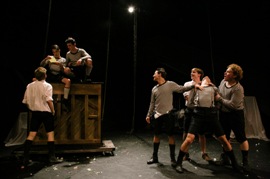 Scenic designer Christopher Scott Murillo fills Inner-City Arts’s great big black-box space with an ever-moving configuration of straight-back chairs, piano, and perhaps most significantly, double bed. Cast members entwined to create an enchanted oak is an aah-inspiring director-designer choice. As for the ropes you see hanging from the upstage rafters throughout the show, they do pay off … and big time in the production’s breathtaking finale.
Scenic designer Christopher Scott Murillo fills Inner-City Arts’s great big black-box space with an ever-moving configuration of straight-back chairs, piano, and perhaps most significantly, double bed. Cast members entwined to create an enchanted oak is an aah-inspiring director-designer choice. As for the ropes you see hanging from the upstage rafters throughout the show, they do pay off … and big time in the production’s breathtaking finale.
Murillo’s costumes have just the right retro-modern look as do Carol Doran’s hair and wig designs. Travis Hagenbuch’s lighting is vibrant, varied, and evocative. Philip G. Allen’s sound design is crystal clear as can be. Brent Stewart’s projections are effective, if at times a tad hard to read.
ASL masters Elizabeth Greene, Anthony Natale, and Shoshannah Stern have insured that hearing actors, regardless of signing ability when cast, come out looking to this reviewer’s admittedly unpracticed eyes, quite fluent indeed.
Spring Awakening is presented by Deaf West Theatre in Asoociation with The Forest Of Arden, Cody Lassen, and Jarrod Musano. It is produced by David. J. Kurs, Christopher Sepulveda, and Ann E. Wareham, its concept developed for Deaf West Theatre by Arden and Andy Mientus.
Blake Silver is associate director and Schuyler Helford assistant director.
Roles have been cast by Beth Lipari and Bruce Newberg, including Joey Antonio, Julian Comeau, Gabrielle Garza, and Karla Gutierrez as swings.
TJ Kearney is production stage manager.
As someone for whom Cal State Fullerton’s upcoming Spring 2015 production will be my dozenth (though probably not last) Spring Awakening, I am perhaps uncommonly qualified to state (and in no uncertain terms) that there has never been one more uniquely brilliant than Deaf West’s.
An audience member seeing Spring Awakening for the first time last night commented, “I can’t imagine it being done any other way,” high praise indeed for Michael Arden, Spencer Liff, and the company of artists who have combined talents to dazzling effect in this most extraordinary of revivals.
Inner-City Arts, 720 Kohler Street, Los Angeles.
www.deafwest.org
–Steven Stanley
September 18, 2014
Photos: Tate Tullier
Tags: Deaf West Theatre, Duncan ShEIk, Los Angeles Theater Review, Michael Arden, Steven Sater



 Since 2007, Steven Stanley's StageSceneLA.com has spotlighted the best in Southern California theater via reviews, interviews, and its annual StageSceneLA Scenies.
Since 2007, Steven Stanley's StageSceneLA.com has spotlighted the best in Southern California theater via reviews, interviews, and its annual StageSceneLA Scenies.







 COPYRIGHT 2025 STEVEN STANLEY :: DESIGN BY
COPYRIGHT 2025 STEVEN STANLEY :: DESIGN BY